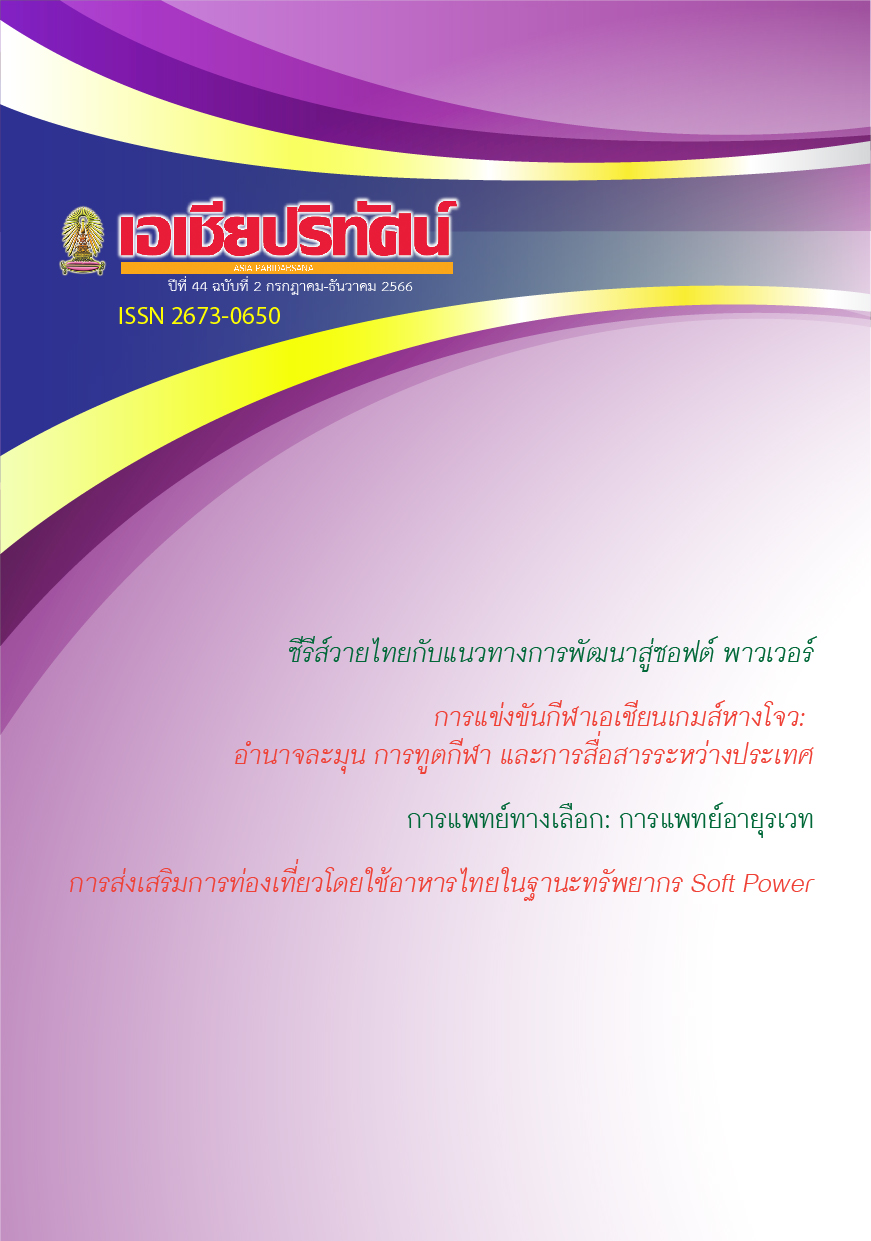Thai Cuisine as a Soft Power Resource for Tourism Promotion
Main Article Content
Abstract
Promoting cultural and health-oriented tourism is a strategic approach that Thailand should prioritize and utilize as a primary mechanism for being a global tourist destination which would serve to mitigate the impact of revenue loss caused by the COVID-19. This article investigates potential of Thai cuisine and related policies to address and revitalize Thailand's tourism sector so that there will be appropriate preparation for the upcoming challenges. To do so, the author provides policy recommendations and legal changes, such as amendment of the Health Business Establishments Act to allow other businesses promoting Thai identity to cooperate with health establishments or amendment of the Sanatoriums Act to allow health businesses to operate within other businesses. Moreover, the author discusses tax-related issues to supplement the guidelines. They are at the very end of this article.
Article Details

This work is licensed under a Creative Commons Attribution-NonCommercial-NoDerivatives 4.0 International License.
บทความทุกบทความเป็นลิขสิทธิ์ของสถาบันเอเชียศึกษา ดูตัวอย่างอื่นประกอบReferences
กรุงเทพธุรกิจ. 2565. เอเปค (APEC) เวทีสร้าง soft power ของไทย อย่างไร?. เข้าถึงเมื่อ 4 เมษายน 2566. สืบค้นจาก https://th.tradingview.com/news/bangkokbiznews:94b258ed5:0/.
กองทุนส่งเสริมวิทยาศาสตร์ วิจัยและนวัตกรรม. 2564. “Covid-19 ต่อภาคการท่องเที่ยวไทย ผลกระทบและแนวทางการแก้ปัญหา.” 2564. หน่วยบริหารและจัดการทุนด้านการเพิ่มความสามารถในการแข่งขันของประเทศ. เข้าถึงเมื่อ 4 เมษายน 2566. https://www.mots.go.th/download/BannerLink/PBVol01Covid_DigitalEd.pdf.
งามเนตร เอี่ยมนาคะ และคณะ. 2566. THAILAND HEALTH TOURISM. สู่เส้นทางสุขภาพสายประเทศไทย. The Journey to Thailand Health Tourism EP.1.
ไทยรัฐออนไลน์. 2566. บทใหม่ของการท่องเที่ยว Amazing Thailand ชู 5F soft power และท่องเที่ยวเชิงสุขภาพ. เข้าถึงเมื่อ 7 เมษายน 2566. สืบค้นจาก https://www.thairath.co.th/lifestyle/2651805.
ธนาคารเพื่อการส่งออกและนำเข้าแห่งประเทศไทย. 2564. เจาะตลาดอาหารฮาลาล ท่ามกลางการระบาด COVID-19. เข้าถึงเมื่อ 8 เมษายน 2566. สืบค้นจาก https://kmc.exim.go.th/detail/20210121152800/20210122161617.
ธันยมัย เจียรกุล. 2565. “มุมมองของนักท่องเที่ยวชาวต่างชาติทั้งที่เป็นมุสลิมและไม่ใช่มุสลิม และผู้ประกอบการร้านอาหารฮาลาลของไทยต่อการสื่อสารการตลาดแบบบูรณาการ และคุณภาพการบริการที่ทำให้เกิดการเลือกใช้บริการร้านอาหารฮาลาลในประเทศไทย.” Journal of Business Administration and Languages (JBAL), 10 (2), 123-138.
นันธิดา แดงขาว และ สุพรรษา หลังประเสริฐ. 2564. “แนวทางการพัฒนาอาหารไทยสู่มาตรฐานฮาลาล.” วารสารมหาวิทยาลัยราชภัฏ ยะลา, 18 (1), 12-23.
วริษฐา ประจงการ, ทิพย์ประภา เหรียญเจริญ และ ณิชาภัทร สุรวัฒนานนท์. 2566. “เปิดสวิตช์ภาคการท่องเที่ยวอย่างไรให้คุ้มเสี่ยง.” ธนาคารแห่งประเทศไทย. เข้าถึงเมื่อ 9 เมษายน 2566. https://www.bot.or.th/th/research-and-publications/articles-and-publications/articles/Article_13Oct2020.html.
สภาพัฒน์. 2566. (ร่าง) แผนแม่บทภายใต้ยุทธศาสตร์ชาติ ประเด็น (05) ประเด็น การท่องเที่ยว (ช่วงที่ 2 ของยุทธศาสตร์ชาติ (พ.ศ. 2566 – 2580)) (ฉบับปรับปรุง). เข้าถึงเมื่อ 8 เมษายน 2566. สืบค้นจาก http://nscr.nesdc.go.th/wp-content/uploads/2022/07/Draft-version-of-Master-Plan-05-Tourism.pdf.
สวนดุสิตโพล. 2565. อาหารไทย...เอกลักษณ์ไทย. เข้าถึงเมื่อ 8 เมษายน 2566. สืบค้นจาก https://suandusitpoll.dusit.ac.th/UPLOAD_FILES/POLL/2565/PS-2565-1669519887.pdf.
อภิชัจ พุกสวัสดิ์ และ กุลทิพย์ ศาสตระรุจิ. 2556. “การประชาสัมพันธ์ภายใต้กระแสสื่อสังคมออนไลน์.” Journal of Public Relations and Advertising, 6 (2), 24-38.
อริยา ส่งแสงชัย. 2559. “การจัดการด้านการรับรองมาตรฐานอาหารฮาลาลที่ส่งผลต่อการสร้างความได้เปรียบทางการแข่งขันของผู้ประกอบการอาหารไทย.” มหาวิทยาลัยกรุงเทพ, คณะบริหารธุรกิจ.
SHA. 2566. โครงการยกระดับอุตสาหกรรมท่องเที่ยวไทยมาตรฐานความ ปลอดภัยด้านสุขอนามัย. SHA. เข้าถึงเมื่อ 7 เมษายน 2566 https://web.thailandsha.com/about/details.
Hsiao, Tina. 2562. “อาหารฮาลาลในประเทศไทย.” Michlin guide. เข้าถึงเมื่อ 8 เมษายน 2566. https://guide.michelin.com/th/th/article/features/halal-dining-in-thailand.
HEALTHMENOW. 2562. ประเทศที่มีโรงพยาบาลได้การรับรองมาตรฐาน JCI มากที่สุดในโลก. เข้าถึงเมื่อ 8 เมษายน 2566. สืบค้นจาก https://healthmenowth.com/hospital/thailand-joint-commission-international-jci/.
ภาษาอังกฤษ
Battuta. 2566. Halal restaurants in Bangkok. Accessed April 7, 2566. Retrieved from https://www.battuta.me/halal-restaurants-in-bangkok/.
British Council. 2559. “The Soft Power of Twitter. January 2016.” British Council. Accessed April 9, 2566. https://www.britishcouncil.org/research-policy-insight/insight-articles/soft-power-twitter.
Chaiyapong, A., Laeheem, K., Sakolnakorn, T. P. N., & Chuaboon, W. 2565. “Muslim Women and Health Lifestyle in Deep South of Thailand.” Suratthani Rajabhat Journal, 9(2), 219-239.
Kemp, S. 2566. DIGITAL 2023: THAILAND. Accessed April 9, 2566. Retrieved from https://datareportal.com/reports/digital-2023-thailand.
Mavrodieva, A. V., Rachman, O. K., Harahap, V. B., & Shaw, R. 2562. “Role of social media as a soft power tool in raising public awareness and engagement in addressing climate change.” Climate, 7(10), 122.
Statista. 2566. Most used social media platforms in Saudi Arabia in 2022, by share of users. Accessed April 6, 2566. Retrieved from https://www.statista.com/statistics/1318233/saudi-arabia-most-used-social-media-platforms-by-share-of-users/.
The World Bank. 2566. Individuals using the Internet (% of population) - Thailand. Accessed April 6, 2566. Retrieved from https://data.worldbank.org/indicator/IT.NET.USER.ZS?locations=TH.
UNWTO. 2563. “Tourism Back to 1990 Levels as Arrivals Fall by More than 70%.” UNWTO. Accessed March 18, 2566. https://www.unwto.org/news/tourism-back-to-1990-levels-as-arrivals-fall-by-more-than-70.


